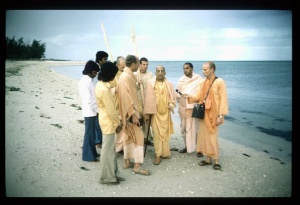SB 5.8.19

A.C. Bhaktivedanta Swami Prabhupada
TEXT 19
- nimlocati ha bhagavān
- sakala-jagat-kṣemodayas
- trayy-ātmādyāpi mama
- na mṛga-vadhū-nyāsa āgacchati
SYNONYMS
nimlocati—sets; ha—alas; bhagavān—the Supreme Personality of Godhead, represented as the sun; sakala-jagat—of all the universe; kṣema-udayaḥ—who increases the auspiciousness; trayī-ātmā—who consists of the three Vedas; adya api—until now; mama—my; na—not; mṛga-vadhū-nyāsaḥ—this baby deer entrusted to me by its mother; āgacchati—has come back.
TRANSLATION
Alas, when the sun rises, all auspicious things begin. Unfortunately, they have not begun for me. The sun-god is the Vedas personified, but I am bereft of all Vedic principles. That sun-god is now setting, yet the poor animal who trusted in me since its mother died has not returned.
PURPORT
In the Brahma-saṁhitā (BS 5.38), the sun is described as the eye of the Supreme Personality of Godhead.
- yac-cakṣur eṣa savitā sakala-grahāṇāṁ
- rājā samasta-sura-mūrtir aśeṣa-tejāḥ
- yasyājñayā bhramati sambhṛta-kāla-cakro
- govindam ādi-puruṣaṁ tam ahaṁ bhajāmi
As the sun arises, one should chant the Vedic mantra beginning with the Gāyatrī. The sun is the symbolic representation of the eyes of the Supreme Lord. Mahārāja Bharata lamented that although the sun was going to set, due to the poor animal's absence, he could not find anything auspicious. Bharata Mahārāja considered himself most unfortunate, for due to the animal's absence, there was nothing auspicious for him in the presence of the sun.